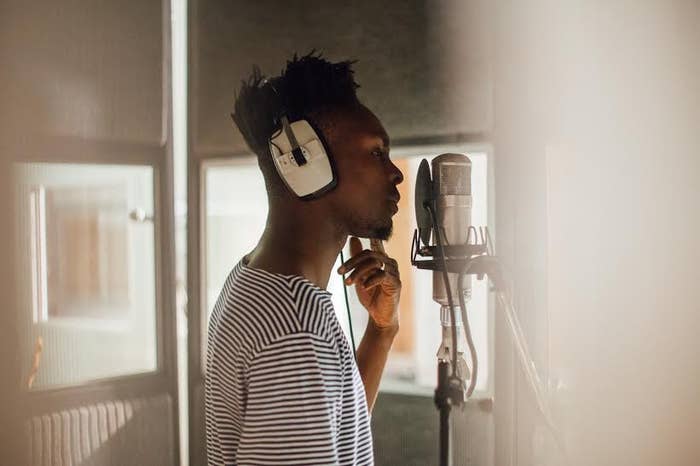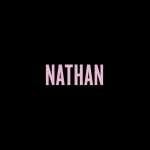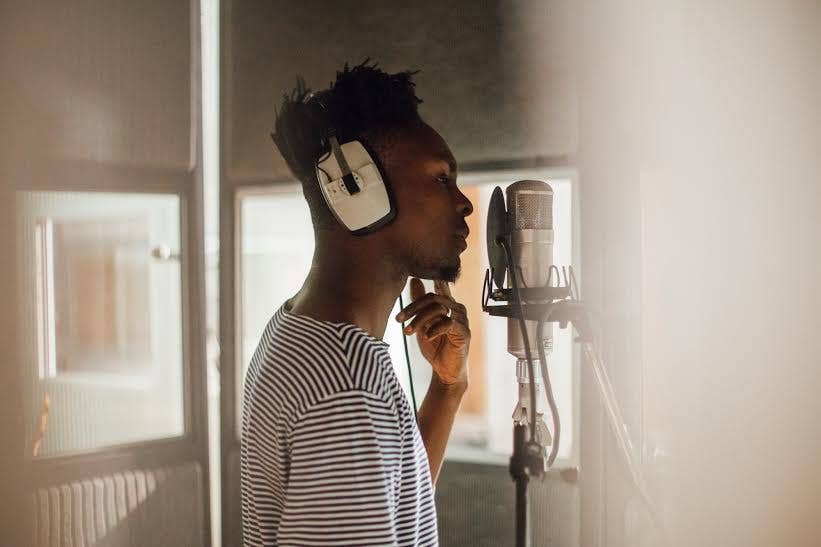
Making an impact in the crowded, cut-throat music industry is no mean feat for any new artist, and building a fanbase can take several years. Nevertheless, emerging singer-songwriter Azekel has managed to form a firm following early on with his own brand of electronic-dipped R&B-soul. His early support even includes acknowledgement from one of the most respected names in pop music: Prince.
The "Purple Rain" singer took to Twitter last year—during his brief stint on social media—to share Azekel's breakout single, "New Romance", with his millions of followers. Azekel, born in Nigeria and raised in East London, hasn't looked back since, going on to release a critically-acclaimed, self-produced EP in Circa, performing on the BBC Introducing Stage at Glastonbury, racking up over three million streams on Spotify and recording at the iconic Abbey Road Studios, where he produced his latest single, "The War Inside"—a soulful cut lifted from his forthcoming project, Raw Vol. 2.
We caught up with the budding star to find out more about his new EP, his musical influences, and what he really thinks about the current state of British R&B.
COMPLEX: Congratulations on all your success with Raw Vol. 1. You recently released the first single from Vol. 2, "The War Inside"—tell us about the inspiration behind that track.
Azekel: It's the social commentary of what's going on around me and just trying to experiment more with my production.
And how was it recording it at the iconic Abbey Road Studios as part of the Converse Rubber Tracks initiative?
It was a great experience. It provided me with a lot of space and possibilities to use a lot of instruments. It also allowed me to have fun with it, and just try out a lot of different things with the track. Even if they didn't work, it provided me the opportunity as I usually just record in the living room of my flat.
What can fans expect from the rest of the EP?
More social commentary. On a lot of the other stuff I've done, I just wrote about relationships and experiences I've had, but I wanted to write about more social commentary with this project. Not every song is socially directed, but there is more throughout the EP.
Does the overall sound differ from what you have released previously?
It's not too far off. There's more guitar playing in it, but I wouldn't say it's too far off.
Do you have a release date in mind?
Early next year—hopefully February or March.
Your previous EPs were met with great acclaim. Do you feel under any pressure with the new music?
Not really. I just want to make sure the music is engaging and that people embrace it. The pressure comes from me because I always try and outdo myself, experiment, and do something new that I haven't done before.
What is your end goal with the project?
Just to engage with people and get the music out to as many people as possible. I want to start performing more with the release of the EP and really usher myself into writing a full-length album. I've started writing some of it, so I just need to eventually start making it. But most of it is done in my head; that's how I usually make my music.
What typical creative process do you go through when making music?
Usually, the songs come in my head—they get given to me—then I start writing and try out some arrangement in my head. Then—and it could be a week, two weeks, or months later—one day, I'll just start producing what's in my head and then I vocal it.
How important is it for you to have complete creative control in all areas?
It's vital for me because I have a certain kind of sound. I don't know what that sound is, and I can't really explain it, but it just feels good on my ear. It's not that I'm overly selfish, and I always wanna go and produce and write and do everything myself, more time it's just because it's quicker to go and do and it's an easier process to rely on myself rather than rely on other people. I guess it's a great challenge as well, like chipping away at a tree for a while, and eventually you get it down. It's very self-rewarding, so that's why I love doing all of it myself. I've worked with other producers before, and other people have mixed my music before, so it's not that I don't want anyone to do that, it's just that hasn't really happened whilst working on this particular EP.
How long have you been singing, writing, and producing for?
For a while, man. I'm in my 20s so since I was in my early teens, or earlier, like 11 or 12.
Do you have a preference? For instance, if you could only continue to work in one area, which would you choose?
I guess it's easier for me to say writing and producing. I actually only started singing, like, five years ago because I started writing and producing initially, so singing is still very much a new thing for me, and that's why performing is kind of a new thing for me too. But I guess it all comes in a package, so I don't know if I could pick one. If I only did writing and producing, I reckon I would start regressing as a singer and a performer, but I want to progress with those.
I'm definitely not for the labels; like, I wouldn't put my music into "progressive R&B" or "alt-R&B."
Is there anyone you would like to collaborate with in the future?
The drummer Questlove, who worked on D'Angelo's new album, he'd be cool. I would love to go and work with some amazing vocalists, like Beyoncé or something—anyone and everyone from independent artists to commercial artists and anyone I get a vibe with. But I've been pretty happy just working with myself so far.
Your music is an amalgamation of sounds that include R&B, soul, and electronic feels. Who would you say has influenced your sonic stylings?
I've got so many musical influences, and everything I listen to influences me, so there are too many people to mention. But I'm really inspired by a lot of soul and funk. I love electronic music as well, but most of my inspiration leans more towards black music, like soul, funk and R&B. Anyone from Marvin Gaye to Donny Hathaway, from Curtis Mayfield to D'Angelo—who is my musical guide—and Bilal. I'm also inspired by a lot of cool British artists, like Radiohead, and alternative stuff that isn't really music from my cultural background.
Speaking of Bilal, you recently attended the New Yorker Festival and joined a panel alongside him, as well as Kelela and James Fauntleroy, to discuss the current state of R&B music. What was that experience like for you?
It was really cool, and different, because it was completely for an American crowd. The conversation went from music to politics and everything that's happening culturally in America with black and white people, and police brutality came in as well. But because I'm from Britain, I kinda got lost in it. I didn't want to seem rude talking about their situation, you know? But it was a great experience, and I respected all the people on the panel.
The panel also discussed the recent emergence of different labels to describe R&B music, such as "nu-R&B" and "PBR&B", which have divided opinions. What are your thoughts on all these labels?
I'm definitely not for the labels; like, I wouldn't put my music into "progressive R&B" or "alt-R&B." I may have done when I first started, but as I've come more into my own, I don't think I'd do that now. I think there are new labels because of the internet, which has enabled people to delve into different genres of music, and subsequently that's gonna obviously have an effect on the music you make as a musician. When I was coming up, I used to download a lot of different music and music of different genres and music that someone from my background, from an east London estate, wouldn't believe in listening to. And that has obviously had an effect on the music I put out.
What do you think about the R&B music scene in the UK?
I don't think it's as vibrant as the one in America.
There seems to be a high demand for grime music in the UK—do you think that R&B gets overlooked?
I think there being a high demand for grime is rightly so because that's what speaks to the youth, and I can understand that. The artists are talking about how they feel living in London or in the UK; I don't think there are as many artists in the UK who are making sounds in R&B that gravitate to the public or the youth here, so that's why it's not as popping as it is in the States.
Finally, with 2016 only a few weeks away, what are your plans for the rest of the year and early next year?
I'm gonna go and do some shows and try and finish this EP, and then, God willing, I'll put it out early next year and start working on the album and hopefully put it out next year, too, if it's possible and feasible. I just want to keep on performing, put out really good music, and for people to really engage with it.

